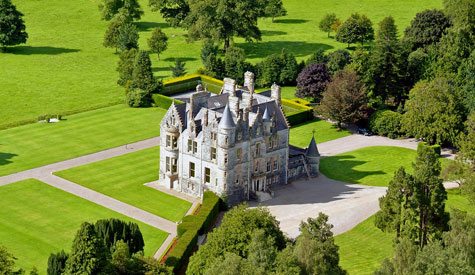JOHN COLTHURST, of Ballyanly, County Cork (great-grandson of Christopher Colthurst, murdered near Macroom, in 1641, son of Colonel John Colthurst, who was murdered by the rebels, 1607), High Sheriff of County Cork, 1725, married Elizabeth, daughter of Sir Nicholas Purdon, Knight, and had two sons,
NICHOLAS, his heir;The elder son,
JOHN, successor to his brother.
COLONEL NICHOLAS COLTHURST (1676-1754), of Ballyanly, High Sheriff of County Cork, 1736, espoused Penelope, second daughter of Sir John Topham, Knight, of Dublin, one of the Masters in Chancery, and had (with two daughters), an only son, Topham, who died under age.
Colonel Colthurst was succeeded by his brother,
JOHN COLTHURST (1678-1756), of Ardrum, MP for Tallow, 1734-56, High Sheriff of County Cork, 1738, wedded firstly, Alice, daughter of James Conway; and secondly, Mahetabel, daughter of William Wallis.
He was succeeded by his eldest son,
JOHN CONWAY COLTHURST (c1720-75), MP for Doneraile, 1751-60, Youghal, 1761-8, Castlemartyr, 1768-75, who wedded, in 1741, the Lady Charlotte FitzMaurice, daughter of Thomas, 1st Earl of Kerry, by whom he had five sons.
Mr Colthurst was created a baronet in 1774, designated of Ardrum, County Cork.
Sir John was succeeded by his eldest son,
SIR JOHN CONWAY COLTHURST, 2nd Baronet (c1743-87), who was killed in a duel with Dominick Trant; and dying unmarried, the title devolved upon his brother,
SIR NICHOLAS COLTHURST, 3rd Baronet, High Sheriff of County Cork, 1788, who wedded Harriet, second daughter of the Rt Hon David La Touche, and had issue,
NICHOLAS CONWAY, his heir;Sir Nicholas died in 1795, and was succeeded by his only son,
Elizabeth; Catherine.
SIR NICHOLAS CONWAY COLTURST, 4th Baronet (1789-1829), Colonel, Cork Militia, MP for Cork, 1812-29, who espoused, in 1819, Elizabeth, daughter of Colonel George Vesey, and had, with other issue,
GEORGE CONWAY, his successor;Sir Nicholas was succeeded by his elder son,
Charles Vesey.
SIR GEORGE CONWAY COLTHURST, 5th Baronet (1824-78), JP DL MP, High Sheriff of County Cork, 1850, who married, in 1846, Louisa Jane, daughter of St John George Jefferyes, and had issue,
GEORGE ST JOHN, his successor;Sir George was succeeded by his son,
Alice Conway; Louisa Julia.
SIR GEORGE ST JOHN COLTHURST, 6th Baronet (1850-1925), JP DL, who wedded, in 1881, Edith Jane Thomasina, daughter of Captain Jonas Morris, and had issue,
GEORGE OLIVER, his successor;Sir George was succeeded by his elder son,
RICHARD ST JOHN JEFFERYES, succeeded his brother as 8th Baronet;
Edith Dorothy.
SIR GEORGE OLIVER COLTHURST, 7th Baronet (1882-1951), who died unmarried, when the title devolved upon his brother,
SIR RICHARD ST JOHN JEFFERYES COLTHURST, 8th Baronet (1887-1955), High Sheriff of County Dublin, 1920-21,
Sir Richard St John Jefferyes Colthurst, 8th Baronet (1887–1955);
Sir Richard la Touche Colthurst, 9th Baronet (1928–2003);
Sir Charles St John Colthurst, 10th Baronet (b 1955);
The 4th Earl of Clancarty had supported JAMES II, with the result that his forfeited estate was granted to the Hollow Swords Company at the end of the Williamite wars.
In 1704 the Mayor of Cork, Sir James St John Jefferyes, purchased the estate and built a new house attached to the original castle.
This was greatly enlarged by his descendants and developed into large Georgian Gothic building with a central bow, rows of lancet windows and pinnacled battlements.
In 1820 this house was destroyed by fire and not rebuilt, though its remains can still be seen today.
In 1846 Louisa Jane, the Jefferyes heiress, married a neighbour, Sir George Colthurst, of Ardrum near Inniscarra.
He was a man of property, with another large estate at Ballyvourney near the border with County Kerry, along with Lucan House in County Dublin.
He also inherited Blarney on his father-in-law’s death.
When her first children died, Lady Colthurst demanded a new house at Blarney on an elevated site.
This was built in the Scots Baronial style, to the designs of Sir Thomas Lanyon of Belfast who, rather surprisingly, incorporated a number of classical details from Ardrum into the design.
Their high quality shows that this must have been an important building.
BLARNEY HOUSE is typical of its type, with pinnacles, crow-stepped gables and a profusion of turrets with conical roofs.
The interior has a double height inner hall, lit from above, a pair of interconnecting drawing rooms and a massive oak staircase.
The style varies from faux Jacobean to Adam Revival, and the rooms have tall plate-glass windows which overlook the lake.
Nearby, the Jefferyes family created the unique Rock Close, an early 18th century druidic garden layout of large rocks, boulders and yew trees; with dolmens, a stone circle and a druid’s altar.
Today Blarney House is the home of Sir Charles Colthurst, 10th Baronet.
In 2009, Sir Charles donated the family papers of the Colthurst family to the Cork City and County Archives, adding to a previous legal collection relating to this family already in the Archives.
Other former residences ~ Ardrum, Inniscarra; Glenmervyn, Glanmire, Co Cork.
First published in November, 2011.






No comments:
Post a Comment